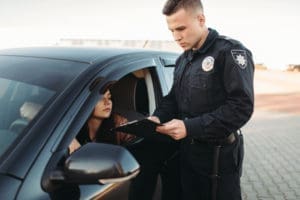Driving Without a License
Driving without a license or driving with a suspended license is a serious criminal offense, and transport courts tend to impose heavy penalties, up to probation or even a jail sentence, depending on the circumstances.
In our firm you will find lawyers who specialize in transport law. If you broke the law – driving while drunk, driving without a license, or causing a car accident – we will be happy to help you.
Crime and Punishment
Driving without a license can be divided into several types of offenses, that differ in their severity and punishment. Driving with the wrong type of license, for example (such as holding a license for a private vehicle while driving a truck or tractor), is not the same as driving with a suspended license. Section 10 of the Road Transport Ordinance distinguishes between different types of offenses. We will review them from light to serious.
Relatively light offenses:
 Driving without a valid license: On the first level of offense are drivers who issued a license in the past but have not renewed it; in other words, it’s an expired license. The time that has passed since the expiration date is very important. Being caught driving with a license that has expired just a few days ago is not the same as being caught with a license that expired two years ago.
Driving without a valid license: On the first level of offense are drivers who issued a license in the past but have not renewed it; in other words, it’s an expired license. The time that has passed since the expiration date is very important. Being caught driving with a license that has expired just a few days ago is not the same as being caught with a license that expired two years ago.
The courts tend to regard this offense as contempt or neglect and, depending on how much time elapsed from the moment of expiration, a different sentence is imposed by the court: up to six months after expiration, driving may result in a fine of 250 NIS, or, alternatively, the offender may request to be judged (intending to prove extending circumstances or other issues with the offense report). Between six months and a year after expiration, the driver will be summoned to court. If the license has expired more than a year before the offense, the licensing office may require the driver to take a course for proper driving, a driving-theory test, or a driving test. If the license has expired more than two years before the offense, the driver will be required to successfully pass a driving-theory test and a driving test as a condition of license renewal, alongside additional penalties to be decided by the court.
Unaccompanied driving: A young driver who is caught driving unaccompanied as required by law for new young drivers will be summoned to court. Courts see this offense as a kind of disregard for the law, and it may result in disqualification of their driving license for one year, a requirement to retake a driving-theory test, conditional disqualification, a fine, and two more years in new-driver status.
Driving a vehicle with the wrong type of license: The third degree of severity goes to driving a vehicle with the wrong type of license, for example, driving a truck or tractor with a license for a private vehicle, or driving a manual-transmission vehicle with a license for an automatic-transmission vehicle. The first example is more severe than the second example. The courts consider these drivers to be dangerous because they lack the skills needed to operate the vehicle that they are driving. In such cases the courts tend to impose disqualification for a long period, conditional disqualification, and a fine. If the offense is recurring, imprisonment is also possible.
“Moderate” offenses:
Use of a vehicle without the knowledge of the owner (use of vehicle without permission): This includes theft of vehicles but also children’s use of their parents’ vehicles without the parents’ knowledge. If the driver’s license is expired, the regulations stipulate suspension for a minimum period of three years. But, if no license has ever been issued, the minimum penalty amounts to three years of actual imprisonment. If the driver was a minor while driving, the punishment is even more severe and may reach up to five years in prison and three years of disqualification.
Allowing a person who is not authorized to drive a vehicle: The transport regulations impose the responsibility on the vehicle owner to ensure that the person he allows to drive his vehicle is fit to drive and has a valid driver’s license for the type of vehicle in question. If the person driving the vehicle does not have a license at all, especially when it comes to a minor, this may also lead to actual prison sentences. The courts will decide on the severity of the sentence according to the severity of the case and the level of malice that accompanies it.
The offense is called “Hatarat Nehiga” (Hebrew for “allowing to drive”). Section 36B (c) of the Road Transport Ordinance provides for an actual imprisonment of three years and a fine and, if the driver is a minor, the sentence of imprisonment may reach five years, disqualification of a license for a minimum period of three years, and a fine.
And the most severe offense:
Driving without ever having been issued a license or driving with a disqualified license: Among the most serious offenses is driving with a disqualified license, which is likely to result in the most severe penalties. The law stipulates for this offense a maximum sentence of two years in prison as well as a future suspension of one’s driving license for a set period of time. But this offense, too, is divided into two cases: driving with a disqualified license for the first time, especially if there are exceptional circumstances that may justify this, such as a medical emergency that requires driving to a hospital; and a situation of repeat offenses.
This offense is often combined with the offense of allowing an unauthorized person to drive a vehicle. It is important to understand that even a minor driver, if driving without a license, is likely to be tried severely (as long as he is of criminal liability age). This is a criminal offense for all intents and purposes, for which the minor will be tried in a juvenile court, and it could tarnish his future.
What is the significance of disqualifying a license for someone who has never issued a license in the first place?
Once the offender does issue a license, he will be required to deposit it with the court secretariat. The period of his disqualification begins on the day he deposits his license and not on the day of sentencing, as is commonly thought.
As stated, courts regard driving without a license or driving with a disqualified license as a defiance to the rule of law and law enforcement authorities, and as one of the most serious transport offenses. Driving in such a condition renders a person unfit to drive, and the penalties range from disqualifying his license for an extended period of time to actual imprisonment for two years, depending on the context of the offense and whether it is a repeat offense. It is important to understand that this is an offense that is added to the offender’s criminal recorded and not transport-offense record.
Driving Without a License and Causing an Accident
Your situation is even more complicated if you cause an accident or make an offense and consequently, it is discovered that you were driving without a license, certainly if damage was caused to property or a person was hurt. In such circumstances, your situation will be worse.
The number of fatalities in road accidents has risen in recent years, and those involved in the fatal accidents often turn out to have been driving without a valid driver’s license. Due to the dire consequences and the lives of victims and sometimes entire families who have been deprived, the courts treat this offense with extreme severity and tend to impose heavy penalties in order to create deterrence.
Thus, for example, a Be’er Sheva resident driving without a license was discovered and caught eight times. While, after the first few times that he was caught, his license was disqualified and he was later detained, on the eighth offense, the Be’er Sheva Court of Traffic Offenses decided on more severe punishment and sent him behind bars for two years, adding a six-year license disqualification and a fine of 1,000 NIS. The court explained that, in this case, the defendant clearly took the law into his hands and acted in mockery and disregard of the requirement to issue a lawful driving license. The court further explained that the fact that reports were recorded by police officers, and even the disqualification penalties imposed on the offender by the Courts of Traffic Offenses, did not affect him at all, nor did they deter him from continuing to drive.
In another case, a Jerusalem Court of Traffic Offenses imposed a 30-day prison sentence, a disqualification for three months, a fine of 1,000 NIS, and probation on a man who confessed to driving an all-terrain vehicle without a license, even though this was his first offense. Judge Mordechay Caduri wrote in the sentence that driving without a driver’s license or with a disqualified license is a serious offense, which entails many risks to the safety of passengers in vehicles and pedestrians, and justifies imposing an actual prison sentence even when it is a first offense. Caduri claims that these offenses indicate deep disregard of the law.
Tip Corner: I was caught driving without a license. What should I do?
- If your driver’s license has not been renewed for economic or technical reasons, we recommend that you renew it before the day of the trial so that you may receive a reduced sentence.
- If you have been summoned to court for driving without a license, we recommend that you prepare and take the driving-theory test and the driving test, and arrive for the first hearing with an active driver’s license. The courts will see this as trying to correct bad behavior and may reduce the sentence.
- If you were unable to complete the process of receiving a license in time for the trial or if you failed the test, request a postponement and arrive for the trial with an active license.
- If you have caused an accident and the driver was without a valid license for the type of vehicle in question, the insurance company will not cover resulting injuries or death, and these will be solely the driver’s responsibility.
- If you drove without a license, you are subject to punishment, but its severity often depends on your personal circumstances and situation. There is a difference between receiving a fine or disqualification of a license and actual imprisonment. Therefore, it is highly recommended to seek legal advice and guidance, and not take the matter lightly.
Driving without a license is one of the most serious offenses mentioned in the Road Transport Ordinance. In recent years, there has been a worsening in punishments used by the courts. Along with a criminal record, disqualifying of the license, and fines, driving without a license may even result in actual imprisonment. It is therefore advisable to be legally represented from the beginning of the proceedings. Our law firm provides you with professional lawyers who are well versed in transport law and have decades of experience.
מאמרים מומלצים

